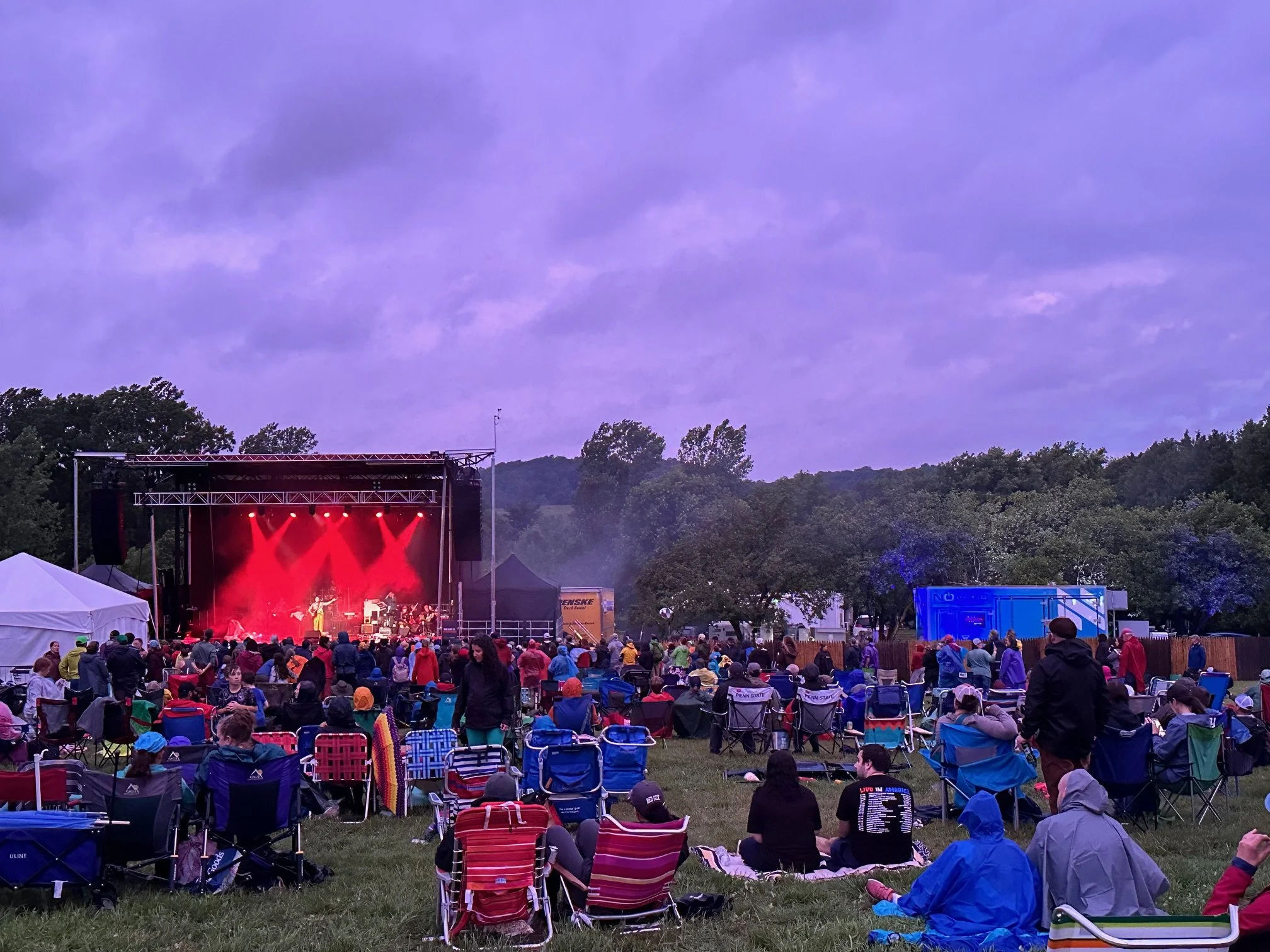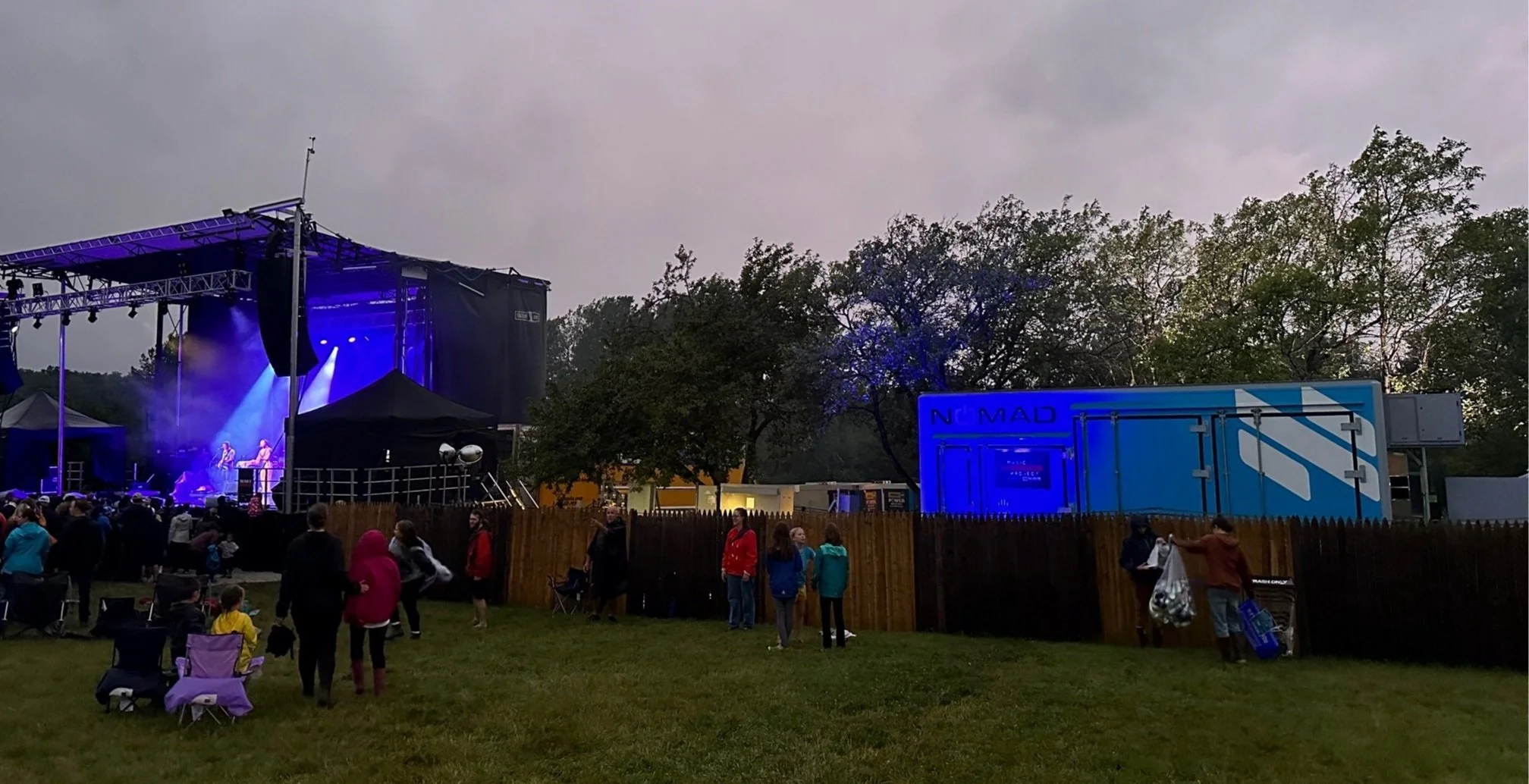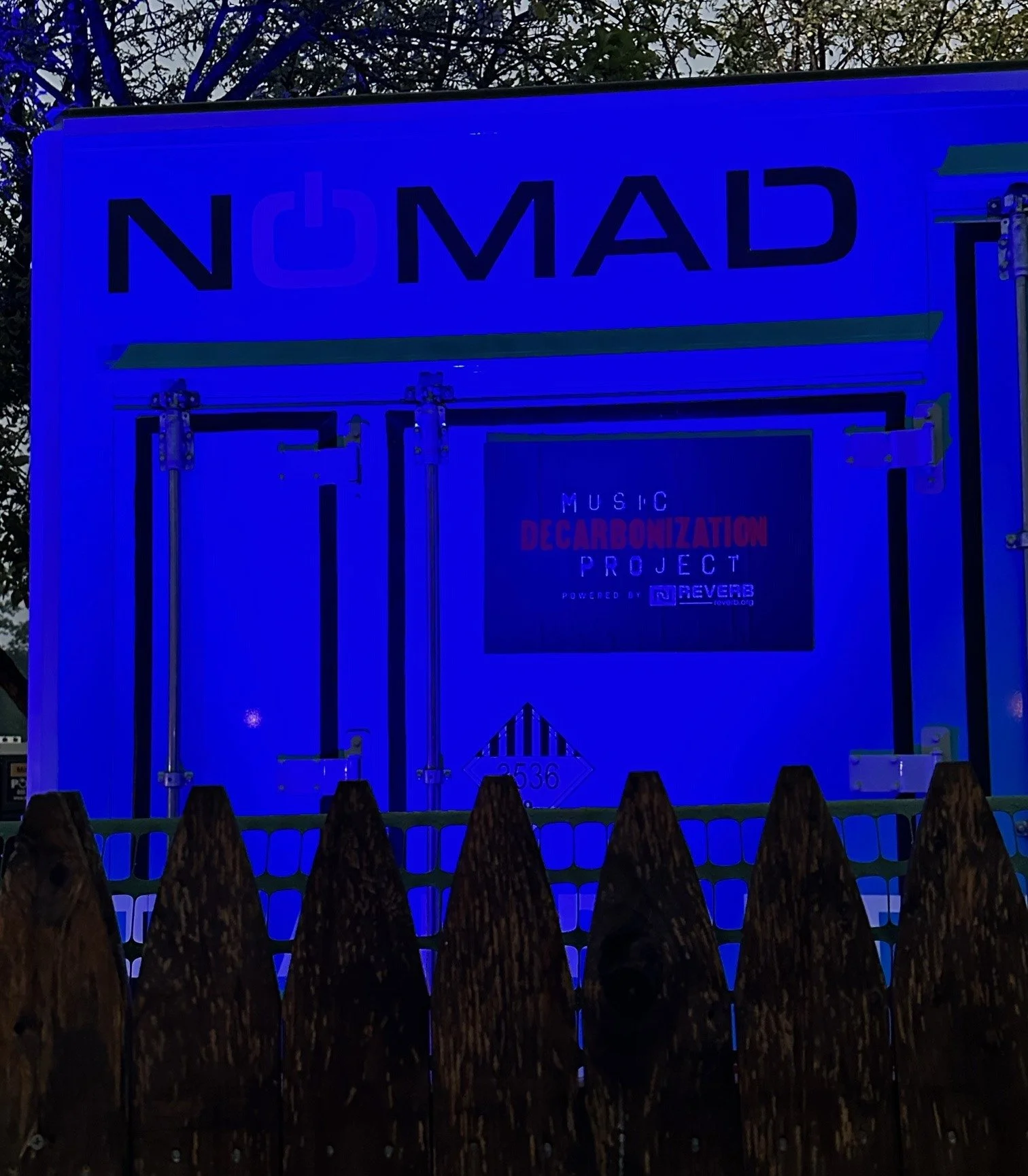NOMAD mobile units deliver clean, quiet power to summer concerts
September 6, 2024 | By Lisa Scagliotti New mobile battery power-storage units manufactured in Waterbury helped fill the Shelburne Museum concert meadow with music this summer and avoided creating two metric tons of carbon pollution from traditional diesel generators.
A NOMAD Voyager mobile battery unit (far right) powers the June Guster concert at Shelburne Museum. Photo by Lisa Scagliotti
The clean, silent battery power units from NOMAD Transportable Power Systems are made at KORE Power in Waterbury. This summer, Higher Ground Music deployed a unit owned by Green Mountain Power as the key energy source for four of the popular annual Ben & Jerry’s Concerts on the Green performances at Shelburne Museum.
Typically powered by diesel generators, this summer’s concerts with Guster, Jason Mraz, Train, and Joe Russo’s Almost Dead bands relied on a NOMAD 1.3 megawatt Voyager unit. Using the battery-stored clean energy in the NOMAD unit avoided adding nearly 4,500 pounds of carbon dioxide pollution into the environment had traditional diesel-powered generators been used, according to NOMAD company officials.
“At the shows, our job was making sure we kept the sound and lights powered so the great musicians on stage could delight the crowds,” said Chris McKay, NOMAD’s chief operating officer. “When we realized that we’d powered 72 hours of concerts – from setup and sound check through breakdown – we decided to look at the environmental impact we were having.”
Using the U.S. Environmental Protection Agency’s Greenhouse Gas Equivalencies Calculator, the output from the NOMAD unit over the four events was the equivalent of a passenger car driving 5,115 miles. Put another way, it’s comparable to burning more than 2,000 pounds of coal or fully charging 132,033 smartphones.
“In just four concerts, we avoided the carbon sequestered by more than 2 acres of U.S. Forest in a year,” McKay noted, referencing another benchmark.
Green Mountain Power kept the unit charged, the company said. In addition to eliminating carbon emissions, the NOMAD Voyager also operates silently, so the concert sound didn’t have generator noise in the mix.
The NOMAD unit delivers clean, quiet electricity. Photo by Lisa Scagliotti
Shelburne Museum Marketing and Communications Director Leslie Wright said this was the first use of a NOMAD unit at the museum for the Higher Ground-run concerts. So far the museum doesn’t have plans for it to be deployed at other events, but the reliance on renewable energy fits in with the museum’s energy philosophy. Shelburne Museum is completely powered by solar energy generated by two large arrays on and adjacent to its campus.
Guster performs in June at Shelburne Museum powered by the NOMAD Voyager mobile unit on the right. Photo by Lisa Scagliotti
Higher Ground: Setting a new standard
The NOMAD project was a first for Higher Ground and hopefully it was the first of many more battery-powered concert series to come, according to Co-Owner Alex Crothers.
The inspiration for seeking out the new energy supply for the 2024 Ben & Jerry’s series at Shelburne Museum came from Guster band member Adam Gardner who co-founded the nonprofit organization REVERB 20 years ago. REVERB works to reduce the environmental impact of concert events by organizing recycling at venues, urging concert-goers to use reusable water bottles and artists to think of their footprint when making decisions around packaging, emissions and more.
Moving to a clean energy source to power a show seemed like a natural step, Crothers said, noting that Gardner shared how the technology for this “had finally hit prime time.”
Crothers said they began talking about it at Guster’s Shelburne Museum gig in 2023 that got called off due to severe thunderstorms. Higher Ground rebooked the band for June 2024 and the search was on for a battery-powered energy source. Originally, they considered a company in Connecticut, Crothers said.
“Then we discovered NOMAD was in Waterbury just 20 miles away and we said we have to do this – it would be silly not to,” he recounted.
There were logistics to figure out but both Green Mountain Power and the KORE Power NOMAD team were interested in making it happen. The end result was Vermont’s – and maybe the country’s – first music series powered by battery-stored energy, Crothers said. In addition to the four concerts this summer, the series has three more dates in September ending with a two-night sold-out run with Lake Street Dive at Shelburne Museum, Sept. 19-20. The NOMAD unit was returned to Green Mountain Power to get recharged, Crothers said, but it will be back for the remaining concerts.
So far, it’s hard to tell how the cost of the Voyager unit compares with running diesel generators. Crothers said the outdoor shows at Shelburne Museum typically had to have two diesel set-ups on site because the traditional generators are “constantly breaking down” and they need maintenance.
This initial summer series was a joint venture with NOMAD as a sponsor, Crothers said, so Higher Ground did not have to cover the cost of the unit. The Voyager also is a much larger unit than needed for these events. Smaller-scale units would work too, he said, noting that NOMAD anticipates new smaller models will be coming off their line in the near future.
Photo by Lisa Scagliotti
Crothers stressed that the biggest benefit clearly is “not having to burn diesel and have the emissions.” And while Higher Ground puts on relatively small outdoor events, Crothers imagines significant potential for much larger festivals to reduce their pollution footprint. For example, a giant festival like the annual Coachella festival in California has “100 generators running for three weeks straight,” he said.
McKay said his team is gaining momentum as the NOMAD units are being put into use powering concerts, sporting events, festivals and other activities where remote and additional energy supply is required. “Every day customers come to us with new use cases, and we’re excited to put NOMAD units to work, delivering power, saving money on fuel costs, and when we can, helping them cut their carbon footprint, too,” McKay said.
NOMAD worked with Connecticut-based Lex Products on the logistics for managing the event power supply. Founded in 1989, the company is a manufacturer of power distribution and energy storage infrastructure with applications that include entertainment, industry and the military. McKay said NOMAD hopes to partner with Lex Products as it rolls out more opportunities for the Voyager units to be used in the field.
KORE Power created its NOMAD Transportable Power Systems division in 2020 to focus on the development of the mobile lithium-ion energy storage platform. The Voyager units are outfitted with KORE Power battery modules. KORE Power is located in downtown Waterbury in manufacturing space formerly used by Green Mountain Coffee Roasters.




